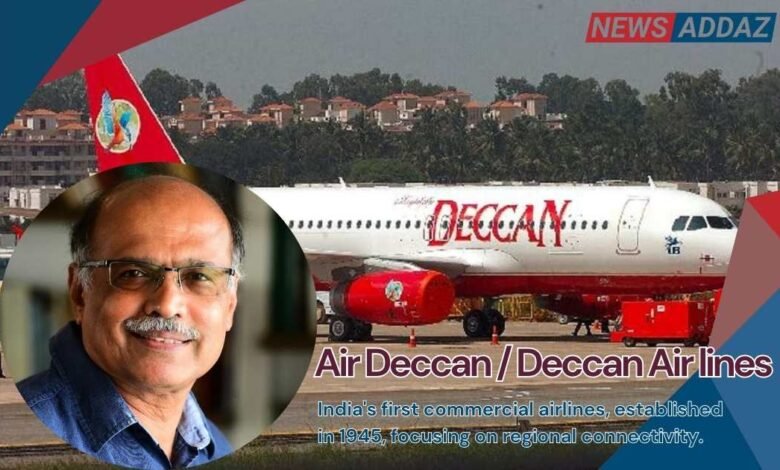Deccan Airlines – The Story of Air Deccan, India’s Cheapest Airlines

Deccan Airlines is a name synonymous with the growth of India’s air travel industry. This pioneering venture laid the foundation for regional connectivity during the post-independence era. Later, its legacy found its way into the formation of Air Deccan that goes on to change the very face of Indian air travel by ushering low-cost aviation. Content provides an overview about the journey of Deccan’s Airlines and its eventual conversion into Air Deccan as well as the latter’s impact on India’s aviation landscape.
Origins of Deccan Airlines
Deccan Airlines was founded in 1945 in Hyderabad under the patronage of the Nizam, whose patronage saw its formation at the twilight of the British colonial empire. It was one of the first commercial airlines of India, commissioned to fill the deficit in regional connectivity between cities, with a view to stimulating the economy of a newly liberated state. The focus of the airline lay mainly in regional connectivity, mainly in southern India.
Services in Deccan airlines:
It started with propeller-driven planes that could fly short-haul routes. With these planes, it could offer:
- Passenger Services: Connecting the cities in southern India, such as Hyderabad, Bangalore, and Chennai.
- Cargo Services: Transporting goods between the industrial/trading hubs.
Its operations bridged southern India and the rest of the country, thus acting as a conduit for integrating southern India with the national economy
Transition at Air Deccan
The legacy of Deccan Airlines was reborn in 2003 with Captain G.R. Gopinath’s Air Deccan, but the new airline Air Deccan was not the same because it focused on democratising air travel by providing low fare to the common man.
Deccan Airlines 1 Rupee Ticket
Well it’s true Air Deccan offerred 1 Rupee Ticket to some passengers. But there is term & condition. A person is only eligible when he book Ticket for first time. It estimated that Around 300,000 people flew on 1 Rupee Ticket
Innovations of Air Deccan
- Low-Cost Model: It brought reduced fares for air travel, breaking myths that assert air travel as costly transport.
- Online Ticketing: It was one of the first Indian airlines to use online ticketing systems.
- Connectivity: It connected tier-2 and tier-3 cities to major airports, thereby increasing access in the regions.
Fleet Expansion and Network
Air Deccan possessed a hybrid fleet of ATR 42/72 and Airbus A320 aircraft. Wherein, the ATR aircraft were used in regional routes, the Airbus fleet was used in busier domestic sectors. Till 2006, Air Deccan was operating more than 350 daily flights, making it an Indian aviation household name.
Problems While Expanding
While Air Deccan was successful, it had problems
- Operational Inefficiencies: Too-rapid growth made it difficult to operate logistically and efficiently.
- Fuel price increase: Fuel price volatility has also moved its profitability levels.
- Customer Service Issues: It was a low-cost airline, which resulted in unmet expectations by the customers based on service offerings.
Contributions to Indian Aviation
Air Deccan in conjunction have achieved the following:
- Regional Integration: They have reached isolated regions that aid in development both economically and socially.
- Democratisation of Air Travel: Air Deccan brought air travel to millions through its low-cost model.
- Catalyst for Competition: The success was followed by other players like IndiGo and SpiceJet who entered the fray.
Gopinath Air deccan: Revival Attempts
In 2017, Captain Gopinath and his wife Bhargavi Gopinath made a temporary re-entry with Air Deccan targeting regional connectivity under the UDAN (Ude Desh ka Aam Nagrik) scheme. It had to shut shop once again due to operational difficulties and lack of serious traction.
Financial problems: Under stress from financial trouble, in 2007, Air Deccan merged with Kingfisher. That action terminated Air Deccan as an independent airline but stabilised its inputs to India’s aviation sector without a doubt. While the manoeuvre was to integrate strength, focusing loss in Kingfisher Airlines’s ultimate collapse minimised the importance of the legacy at Air Deccan.
Legacy and Impact
- Industry Benchmark: It was in keeping with the flying fares abysmally low that Air Deccan set industry benchmarks.
- Economic Growth: Increased connectivity stimulated intra and inter-state trading, tourism, and industrial activity in neglected regions.
- Social Change: It redefined the general perception of flying in India.
Achievement
- First Low-Cost Carrier of India: Air Deccan was the first low-cost carrier in the country.
- Tagline: “Simplifly” was its tag line, symbolising an airline vision to simplify air travel.
- Awards: For its visible presence in Indian aviation, Air Deccan earned a number of awards during its high operational days
Lessons from the Deccan Experience
The rise and fall of Deccan Airlines and Air Deccan teach the following lessons:
- Financial Sustainability: Expansion is not just about growing but sustaining
- Customer Centricity: Aggressive capacity growth has to be matched by customer satisfaction for even low-cost carriers
- Flexibility: Airlines have to adjust to price of fuel, to threats of market conditions, and to changes in technology.
Conclusion
Air Deccan are the biggest milestones in India’s aviation journey. Even though their journeys did come to an end, their contributions will live on in the history of India’s aviation.
FAQ’s
It was one of India’s first commercial airlines, established in 1945, focusing on regional connectivity.
Air Deccan, founded in 2003, took a cue from the heritage of Deccan Airlines to introduce the low-cost carrier model in India.
Merger happened in 2007 due to financial trouble and operational setbacks.
UDAN is an initiative by the Indian government for the development of regional air connectivity under which Air Deccan resurfaced briefly.
Air Deccan stopped operations after a brief revival under the UDAN scheme.
Tagline, “Simplifly,” communicates the intent of the airline to make flying very easy and uncomplicated.